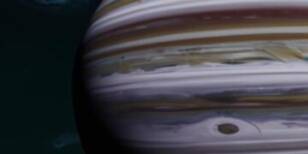The Mighty Planet Jupiter
Jupiter, the largest planet in our solar system, is renowned for its immense size and breathtaking beauty. Positioned as the fifth planet from the sun, it derives its name from the king of the Roman gods.

Key Facts about Jupiter
- With a diameter of 86,881 miles, Jupiter is over 11 times wider than Earth.
- Composed mainly of hydrogen and helium gas, it houses a small rocky core at its center.
- Jupiter boasts a dense atmosphere characterized by vibrant bands of clouds, including the iconic Great Red Spot.
- It is orbited by a total of 79 known moons, with the four largest being Io, Europa, Ganymede, and Callisto.
Exploring Jupiter
Various spacecraft, such as NASA’s Juno mission, have ventured to Jupiter, with Juno conducting studies on the planet since 2016. These missions have yielded valuable insights into Jupiter’s atmosphere, magnetic field, and internal composition.
In the coming years, scientists aim to launch more missions to Jupiter to delve deeper into its enigmatic nature and unravel the mysteries surrounding its history and formation.
Interesting Facts
Jupiter holds the title of the fastest spinning planet in our solar system, completing a day in just about 10 hours.
Despite its massive size, Jupiter’s rapid rotation causes it to be slightly flattened at the poles and bulging at the equator.
Boasting the strongest magnetic field of any planet in our solar system, Jupiter generates a vast radiation belt around its vicinity.
Conclusion
Jupiter stands as a captivating planet that continues to intrigue scientists and space enthusiasts alike. Its sheer magnitude, striking appearance, and intricate atmosphere render it a truly majestic marvel within the solar system.




















